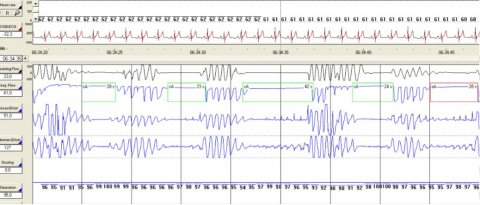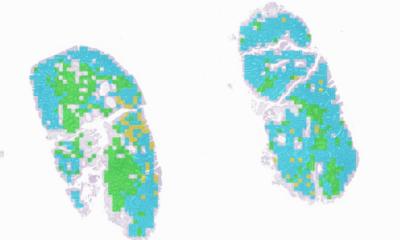Image source: Unsplash/Alexandra Gorn
News • The science of sleep
AI could enhance diagnosis and treatment of sleep disorders
Artificial intelligence (AI) has the potential to improve efficiencies and precision in sleep medicine, resulting in more patient-centered care and better outcomes, according to a new position statement from the American Academy of Sleep Medicine.
Published in the Journal of Clinical Sleep Medicine, the position statement was developed by the AASM’s Artificial Intelligence in Sleep Medicine Committee. According to the statement, the electrophysiological data collected during polysomnography — the most comprehensive type of sleep study — is well-positioned for enhanced analysis through AI and machine-assisted learning. “When we typically think of AI in sleep medicine, the obvious use case is for the scoring of sleep and associated events,” said lead author and committee Chair Dr. Cathy Goldstein, associate professor of sleep medicine and neurology at the University of Michigan. “This would streamline the processes of sleep laboratories and free up sleep technologist time for direct patient care.”

Image source: Eumetaxas, Polysomnography, CC BY-SA 3.0
Because of the vast amounts of data collected by sleep centers, AI and machine learning could advance sleep care, resulting in more accurate diagnoses, prediction of disease and treatment prognosis, characterization of disease subtypes, precision in sleep scoring, and optimization and personalization of sleep treatments. Goldstein noted that AI could be used to automate sleep scoring while identifying additional insights from sleep data. “AI could allow us to derive more meaningful information from sleep studies, given that our current summary metrics, for example, the apnea-hypopnea index, aren’t predictive of the health and quality of life outcomes that are important to patients,” she said. “Additionally, AI might help us understand mechanisms underlying obstructive sleep apnea, so we can select the right treatment for the right patient at the right time, as opposed to one-size-fits-all or trial and error approaches.”
Important considerations for the integration of AI into the sleep medicine practice include transparency and disclosure, testing on novel data, and laboratory integration. The statement recommends that manufacturers disclose the intended population and goal of any program used in the evaluation of patients; test programs intended for clinical use on independent data; and aid sleep centers in evaluation of AI-based software performance. “AI tools hold great promise for medicine in general, but there has also been a great deal of hype, exaggerated claims and misinformation,” explained Goldstein. “We want to interface with industry in a way that will foster safe and efficacious use of AI software to benefit our patients. These tools can only benefit patients if used with careful oversight.”
Source: American Academy of Sleep Medicine (AASM)
03.03.2020





